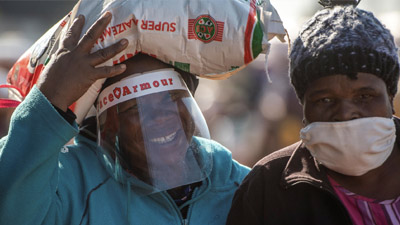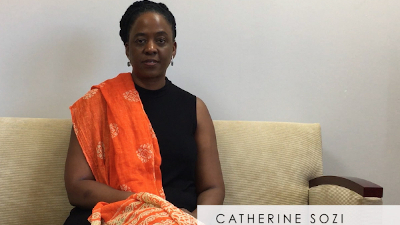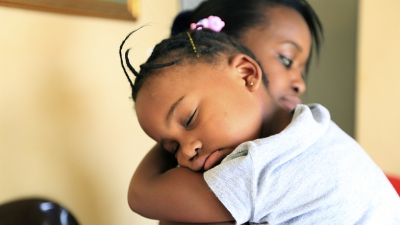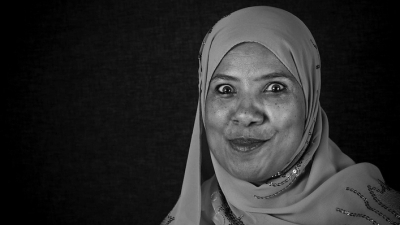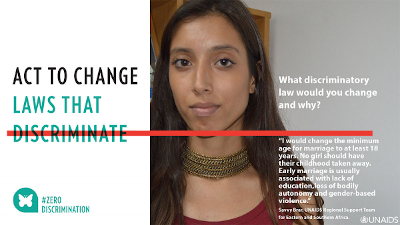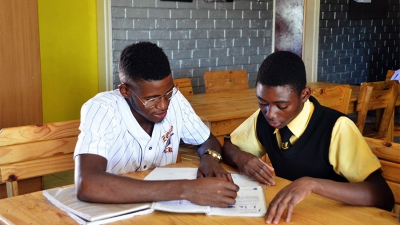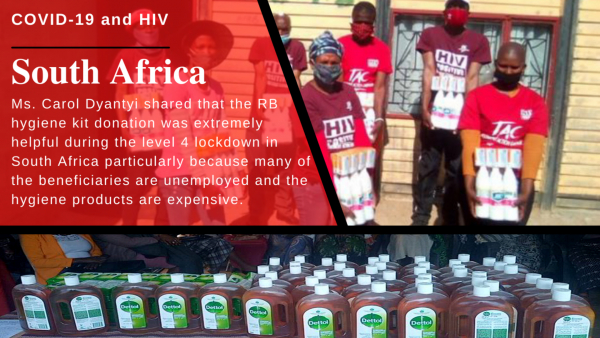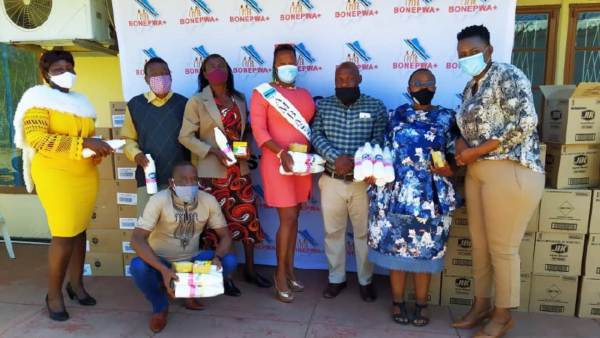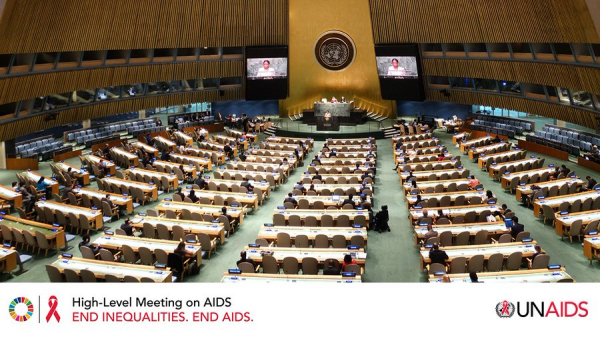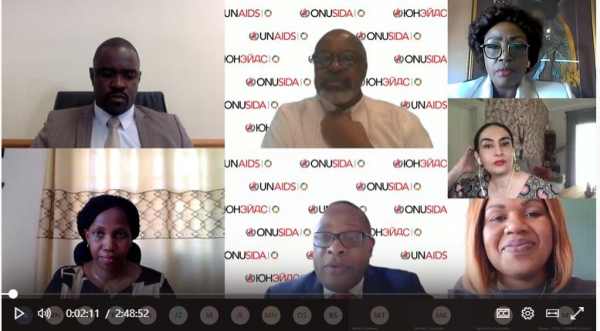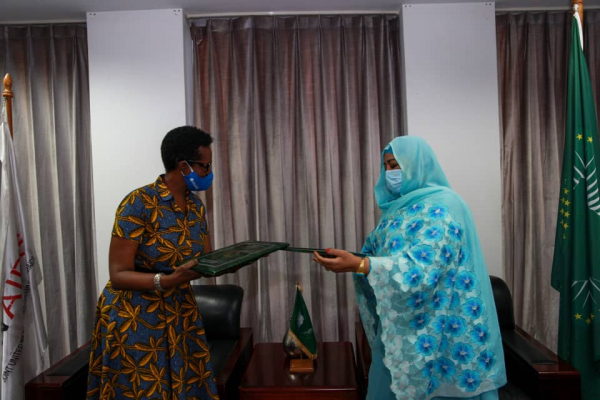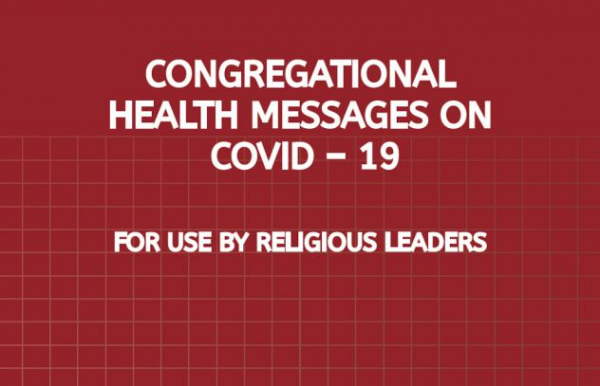Resources
Special Initiatives
Francisco
This is the experience of Ms. Carol Dyantyi, the founder and the Program Manager at Ikageng (South Africa), one of the organizations that benefitted from the donation. Most of the families that received the donation of cleaning materials from Ikageng are hostel dwellers. As such, they would not be able to afford the cleaning materials provided by Reckitt Benckiser. Many of these hostel dwellers are also unemployed, whilst others are too young to be commercially engaged.
“As such”, said Ms. Dyantyi, “this donation gave them hope that finally, they could sanitize, wash their hands – and protect themselves and their families. This donation also meant that they could keep clean and protected against COVID-19. It brought a tear to my eye, just to see that this simple intervention, made such a difference in their lives – and that they were so grateful that there were people out there, who cared about them and their plight. The whole event was very emotional as some of them, out of gratitude, wept and sobbed as a means of saying "thank you", when words were not sufficient.
“Clearly”, said Ms. Dyantyi, “the donation meant that they could finally adhere to regulations and be safe, especially as the donation took place during Level 4 of the Lockdown. I also had to make sure that as families were selected, that all regulations were observed. We also had to stagger the number of families we donated to, as the process took us three days to finish”.
“Nevertheless”, she continued, “the process was positive through and through. It was so gratifying to see how much this was appreciated by all recipients of the donation. The best mechanisms were set up - and we could not have asked for more. It clearly meant so much to our beneficiaries.”
“It still makes me weep when I reflect on how much this meant to these people”, she said.
Botswana: How the joint UNAIDS and RB initiative supports people living with HIV during COVID-19
It is often said that the greatest rewards in life are those which are bestowed on ‘the giver’ – in gratitude for doing some good. This has been the overarching experience of the team at BONEPWA (Botswana Network of People Living with HIV & AIDS). Situated in the country of Botswana in southeastern Africa, the mere act of giving is no mean feat! A vast country, with many remote regions, Botswana has experienced its own issues connected to the breakout of COVID-19.
Tourism has been a mainstream industry for a country blessed with arguably the most contrasting and unique ecosystems in the world. From the great swamps of the Okavango - to the vast plains and grasslands of its central regions, Botswana is unique in many respects. This has not gone unnoticed by adventurous tourists, who have visited this unique and still untouched great wilderness of Africa, in their thousands every year. Great migrations of wildlife - and the only inland delta that does not empty into an ocean, have created these unique swamplands - presenting an unforgettable and unique experience for tourists.
Consequently, a large number of people are employed in the tourism industry – many of whom have now joined the ranks of the unemployed, due to the COVID-19 pandemic. Of these, PLHIV formed a large component.
Not only were PLHIV in the region faced with the loss of income – but also found themselves at higher risk due to their comorbidity of HIV/Aids.
BUT - FAR OUT THERE, THE PEOPLE ARE GRATEFUL!
“When I speak on behalf of the people”, said Mr. Gasekgale Moalosi, Deputy Director of BONEPWA, “ we are sincerely grateful for the support of Reckitt Benckiser Pharmaceuticals and UNAIDS for their joint efforts and support in meeting the needs of PLHIV in Botswana, during the challenging times of COVID-19 pandemic. But most importantly, that simply for showing - that someone cared’.
United Nations High Level Meeting on AIDS 2021
The 2021 United Nations High Level Meeting (HLM) on AIDS took place at a historic time, exactly forty (40) years since the first HIV case was defined and 25 years since The Joint United Nations Programme on HIV/AIDS (UNAIDS) was created. The HLM is an important event in the calendar of UNAIDS because it provided opportunity to review the progress made in reducing the impact of HIV since the last HLM. During the HLM, new, bold and ambitious political declarations were adopted that will shape our course of action in the AIDS response.
In his opening remarks, the United Nations General Assembly president Volkan Bozkir said, “the tragic reality is that the most vulnerable are the hardest hit by HIV. They are at greatest risk of being left behind as AIDS remains not just a health issue, but a broader development challenge.” He added, “AIDS is an epidemic of inequalities. If we are to end AIDS by 2030, we must end inequalities. In this decade of action, if we are to deliver the 2030 Agenda for sustainable development, all member states must re-commit to ending the AIDS epidemic by 2030.”
In her opening remarks, the UNAIDS executive director Winnie Byanyima said, “the evidence and analysis is clear. Inequalities in power, status, rights and voice are driving the AIDS epidemic. Inequalities kill. As our newly agreed shared strategy sets out: to end AIDS, we have to end the inequalities which perpetuate it.” Moreover, Winnie also highlighted three shifts that we need to make in order to end AIDS epidemic which include 1. End inequalities in access to health technologies 2. End inequalities in access to essential services and 3. End inequalities in the realization of rights, particularly for people living with and affected by AIDS.
The HLM brought on board governments, civil society organizations’ leaders and influencers, stakeholders and activists involved in AIDS fight. The event was a culmination of several months of dialogues held with different stakeholders across different regions of the world. And it confirmed that all the voices of different communities were heard and even those who are most vulnerable and marginalized were represented in the conversation. As a representative of the activists and young voices, Yana Panfilova of Teenergizer said, “We took to the streets and meeting rooms to get laws and policies changed. We fought sexual and reproductive health rights and comprehensive sexuality education. We fought to be heard because there is nothing about us without us.”
During the event, the general assembly of the United Nations adopted political declaration on HIV and AIDS themed: Ending Inequalities and Getting on Track to End AIDS by 2030. In a rejoinder, all the global leaders agreed to reduce the annual number of new HIV infections to under 370 000 and AIDS-related deaths to 250 000, eliminate new HIV infections among children, end pediatric AIDS and eliminate all forms of HIV-related discrimination by 2025.
The leaders also committed to providing life-saving HIV treatment to 34 million people by 2025. The political declaration under-scored the importance of all countries to aspire towards achieving the 95-95-95 targets which outline that—95% of all people living with HIV to know their HIV-positive status, 95% of the people who know their HIV-positive status to be initiated and maintained on treatment and 95% of all people on treatment to achieve viral suppression. This is a call to all countries to provide 95% of all people at risk of acquiring HIV within all epidemiologically relevant groups, age groups and geographic settings with access to people-centred and effective HIV combination prevention options.
Progress has been made in the HIV response. UNAIDS data indicate that in 2020, there were 37.6 million people living with HIV out of whom 27.4 million were on treatment, an increase from just 7.8 million people in 2010. Effective measures and rollout of affordable and quality treatment is estimated to have prevented 16.2 million deaths since 2001. AIDS-related deaths have fallen by 43% since 2010, to 690 000 in 2020. Progress in reducing new HIV infections has also been made but has been markedly slower—a 30% reduction since 2010, with 1.5 million people newly infected with the virus in 2020, compared to 2.1 million in 2010.
In full cognizance of two colliding pandemics, the leaders alluded to the fact that the impacts created by both on global economies and are tearing apart communities and reversing the gains made in averting AIDS-related deaths. As noted by Winnie, “The stark inequalities exposed by the colliding pandemics of HIV and COVID-19 are a wake-up call for the world to prioritize and invest fully in realizing the human right to health for all without discrimination.”
To fight the colliding pandemics, the leaders agreed to invest US$ 29 billion annually equitably and sustainably by 2025 in low- and middle-income countries. This includes investing at least US$ 3.1 billion towards societal enablers, including the protection of human rights, reduction of stigma and discrimination and law reform. They also committed to include peer-led HIV service delivery, including through social contracting and other public funding mechanisms. The leaders committed to ensure global accessibility, availability and affordability of safe, effective and quality-assured medicines and health technologies by taking advantage of the existing flexibilities under the Agreement on Trade-Related Aspects of Intellectual Property Rights (TRIPS) as provided for under the Doha Declaration on the TRIPS Agreement and Public Health.
In conclusion, the HLM was a resounding success and we express our gratitude to everyone who took part and contributed to this success. Special mentions to Namibia and Australia for their leadership and co-chairing the 2021 HLM and providing us with a springboard of action for the next five years.
Impact of COVID-19 on the right to health: addressing the structural determinants of health among vulnerable people
As the COVID-19 pandemic continues to impact societies, governments are implementing public health measures and responses to counter its effects. Measures such as restriction of movements and lockdowns are among the recommended public health interventions to curb the spread of the virus.
However, these measures have resulted in socio-economic injustices, especially among vulnerable and marginalized communities. They usually lack social protection and face myriad legal and structural challenges in seeking services. The restriction measures have also resulted in disruption of HIV service delivery.
In response to these issues, the Southern Africa Development Community Lawyers Association (SADCLA) and the East African Law Society (EALS), in partnership with UNAIDS, convened a webinar on the impact of COVID-19 on the right to health.
The webinar highlighted the legal and structural drivers of risk among the most vulnerable, including gender inequality, discrimination and harmful practices. Participants discussed the role stakeholders can play to enhance marginalized groups’ access to appropriate assistance during the COVID-19 pandemic.
“UNAIDS is working with governments and civil society to eliminate stigma and discrimination faced by marginalized people. Human rights should be the foundation in response to inequality in society,” said Aeneas Chuma, Director for the UNAIDS Regional Support Team for Eastern and Southern Africa. Mr Chuma stressed the importance of upholding human rights during the pandemic response.
Civil society organizations in the region play an active role in promoting equality and to reverse the impacts of the pandemic. They play an active role in championing for the rights of women, girls and key populations, that is, men who have sex with men, sex workers, people who inject drugs and transgender people.
In her remarks Rouzeh Eghtessadi, Executive Director of the Southern Africa HIV and AIDS Dissemination Service, noted, “COVID-19 has expounded the deeply rooted inequalities faced by young women and girls, lesbian, gay, bisexual and transgender people, sex workers and vulnerable populations. There is need to strengthen civil society to continue advocating for their rights,” she said.
As the pandemic continues to disrupt services, the gap between the rich and the poor continues to widen and the milestones made in the recent years are at risk. An important element of inequality currently being witnessed is in the access and utilization of vaccines. Particularly there is a glaring gap between the rich and poor countries.
The People’s Vaccine Alliance is warning that developing countries are facing critical shortages of oxygen and medical supplies to cope with COVID-19 cases yet the majority have been unable to administer a single dose of a COVID-19 vaccine. In contrast rich nations have vaccinated their citizens at a rate of one person per second over the last month.
“Access to vaccines is a major challenge to developing countries, yet it is a human right to enjoy the maximum standard of health attainable,” said Sylvia Mthethwa, Pan African Parliamentarian in the Committee on Health, Labour and Social Affairs.
In most cases, the services have become unavailable or redistributed to meet health needs caused by the COVID-19 pandemic. As noted by Bernard Oundo, President of EALS, this has left majority poor people at a further disadvantage. “The pandemic has ravaged our economies, disabled healthcare systems and thrown marginalized and vulnerable communities into further disadvantage,” he said.
Healthcare service delivery in the region has also been impacted resulting into further inequalities particularly considering the majority poor who depend on the public health services.
“COVID-19 has widened the gap between the poor and rich, reduced the gains made in the fight against the gender gap between men and women, and increased mental health problems,” said Vimbai Nyemba of the SADC Lawyers’ Association.
Abigail Noko, Regional Director for the Office of the United Nations High Commissioner for Human Rights said we must ensure equality and remove the structural and legal barriers and governments must ensure inclusion of key populations in their policy processes.
The webinar called for a need for collaborative regional work to remove the barriers faced by key populations in the region.
UNAIDS renews partnership with the African Union for a stronger and more resilient AIDS response in Africa
ADDIS ABABA, 16 March 2021— UNAIDS and the African Union today signed a new Memorandum of Understanding (MoU) to reinforce their partnership and to recommit Member States to end AIDS through the Catalytic Framework to End AIDS, TB and Eliminate Malaria in Africa by 2030.
The MoU commits partners to work towards addressing the socio-economic and political impact of HIV in Africa and accelerate Universal Health Coverage and taking AIDS out of isolation. It will pave the way for more resilient, agile and inclusive health systems in Africa.
“The renewed MoU between the African Union and UNAIDS opens new windows of cooperation and new opportunities for ending AIDS in Africa. We need to deliver on this promise—it is doable,” said Amira Elfadil Mohammed Elfadil, Commissioner for the Department of Health, Humanitarian Affairs and Social Development, at the signing ceremony.
The Department of Health, Humanitarian Affairs and Social Development, formerly known as the Department of Social Affairs, coordinates AU Commission departments and organs to ensure that HIV remains a continental priority and is integrated into the broader development, human rights, humanitarian, and peace and security agenda of the African Union.
“I am delighted to sign the renewed Memorandum of Understanding with the African Union,” said UNAIDS Executive Director, Winnie Byanyima. “The African Union is one of UNAIDS’ most important partners. I look forward to reinforcing our relationship to put communities at the centre of the response to HIV, address other health challenges such as COVID-19 and reduce inequalities that increase people’s vulnerability.”
2021 is a pivotal year as Member States are expected to recommit to the AIDS response with the adoption of a new Political Declaration in June. The partnership agreement with the African Union is being signed as the continent grapples with over-burdened and insufficiently financed health systems in the face of the COVID-19 pandemic.
The new Global AIDS Strategy 2021‒2026 will contain targets for 2025 that aim to close inequalities that drive the AIDS epidemic and put people at the centre to get the world on track to end AIDS. It will guide stakeholders such as the African Union to unite countries, communities and partners to take action to accelerate progress in the AIDS response.
Contact
UNAIDS Johannesburg | Natalie Ridgard | tel. +27 83 408 0851 | This email address is being protected from spambots. You need JavaScript enabled to view it.
UNAIDS Addis Ababa | Agnes Kante | tel. +251 (0) 9 11 50 22 27 | This email address is being protected from spambots. You need JavaScript enabled to view it.
UNAIDS
The Joint United Nations Programme on HIV/AIDS (UNAIDS) leads and inspires the world to achieve its shared vision of zero new HIV infections, zero discrimination and zero AIDS-related deaths. UNAIDS unites the efforts of 11 UN organizations—UNHCR, UNICEF, WFP, UNDP, UNFPA, UNODC, UN Women, ILO, UNESCO, WHO and the World Bank—and works closely with global and national partners towards ending the AIDS epidemic by 2030 as part of the Sustainable Development Goals. Learn more at unaids.org and connect with us on Facebook, Twitter, Instagram and YouTube.
As the COVID-19 pandemic scales across Zimbabwe, there were numerous calls from global partners, including the United Nations Secretary-General, for the expanded use of tele-health and innovative technology solutions to limit congestion in health care systems and the adverse effects of potential disruptions to health care caused by lockdowns.
UNAIDS has embarked on a project to support communities in Kenya during the COVID-19 pandemic. The project has a two-pronged approach to provide short-term, urgent assistance and long-term, structural interventions to empower communities to respond to the immediate and extended impacts of COVID-19.
In Rwanda, restricted movement during the COVID-19-related lockdown has affected population groups differently, particularly sex workers, members of the LGBTI community, and households that survive on a daily income.
Edwin Opwora, a UN Volunteer with UNAIDS in Kenya, is part of the COVID-19 UN team embedded with the Kenyan government. He is based at the office of the government spokesperson, and tasked with collecting and disseminating timely, accurate and reliable information on COVID-19.
The Government of Kenya in partnership with Faith-based organizations and UNAIDS has produced a booklet for religious leaders in response to COVID-19.

